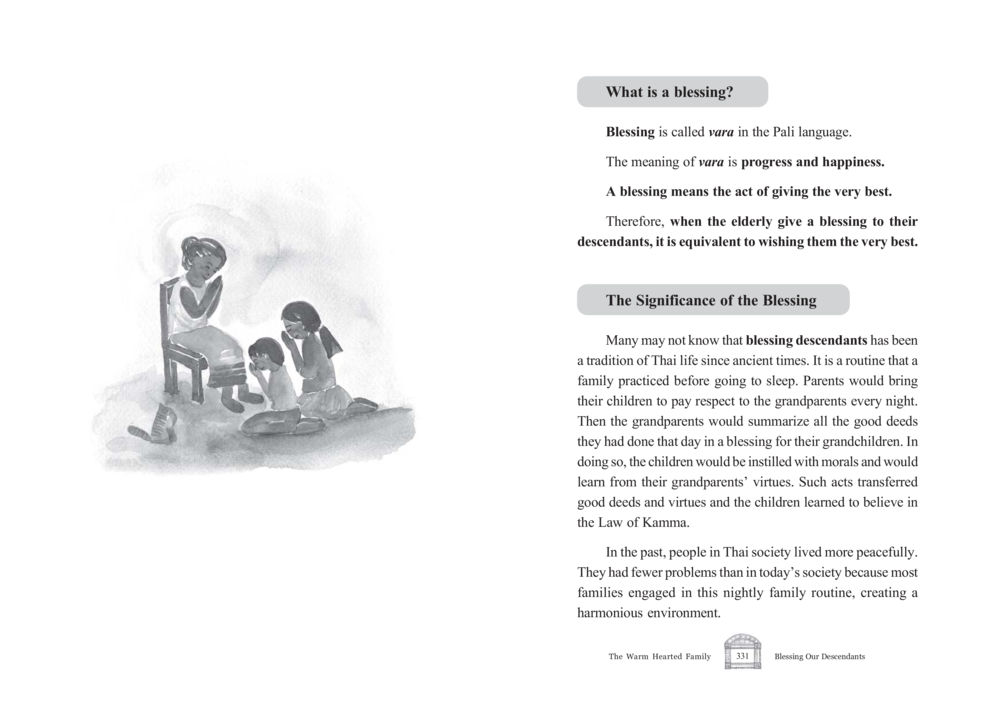The Significance of Blessing in Thai Culture : หน้า 166/207
The Warm Hearted Family : หน้า 166/207 Explore the meaning and tradition of blessings in Thai culture.
0 ครั้ง

สรุปเนื้อหา
คำว่าอวยพรในภาษาไทยหมายถึง 'วาระ' ซึ่งแปลว่าเป็นการให้สิ่งที่ดีที่สุดแก่กัน การอวยพรมีความสำคัญในวัฒนธรรมไทย โดยเฉพาะในการส่งผ่านคุณธรรมและความดีงามจากผู้สูงอายุไปยังเยาวชน ผ่านการเล่าเรื่องและพฤติกรรมดีที่ผ่านมา การทำเช่นนี้ช่วยสร้างสังคมที่มีความสงบสุขกว่าในปัจจุบัน การอวยพรจึงไม่ใช่เพียงแค่คำพูด แต่เป็นการสืบทอดค่านิยมและจริยธรรมที่ดีในครอบครัว ซึ่งช่วยให้เด็กเรียนรู้ถึงกฎแห่งกรรมและพัฒนาคุณภาพชีวิตที่ดีขึ้น
หัวข้อประเด็น
-ความหมายของการอวยพร
-ประเพณีไทย
-การสอนคุณธรรมให้เด็ก
-ความสงบสุขในครอบครัว
ข้อความต้นฉบับในหน้า
What is a blessing?
Blessing is called vara in the Pali language.
The meaning of vara is progress and happiness.
A blessing means the act of giving the very best.
Therefore, when the elderly give a blessing to their descendants, it is equivalent to wishing them the very best.
The Significance of the Blessing
Many may not know that blessing descendants has been a tradition of Thai life since ancient times. It is a routine that a family practiced before going to sleep. Parents would bring their children to pay respect to the grandparents every night. Then the grandparents would summarize all the good deeds they had done that day in a blessing for their grandchildren. In doing so, the children would be instilled with morals and would learn from their grandparents’ virtues. Such acts transferred good deeds and virtues and the children learned to believe in the Law of Kamma.
In the past, people in Thai society lived more peacefully. They had fewer problems than in today’s society because most families engaged in this nightly family routine, creating a harmonious environment.
หน้าหนังสือทั้งหมด

1

2

3

4

5

6

7

8

9

10

11

12

13

14

15

16

17

18

19

20

21

22

23

24

25

26

27

28

29

30

31

32

33

34

35

36

37

38

39

40

41

42

43

44

45

46

47

48

49

50

51

52

53

54

55

56

57

58

59

60

61

62

63

64

65

66

67

68

69

70

71

72

73

74

75

76

77

78

79

80

81

82

83

84

85

86

87

88

89

90

91

92

93

94

95

96

97

98

99

100

101

102

103

104

105

106

107

108

109

110

111

112

113

114

115

116

117

118

119

120

121

122

123

124

125

126

127

128

129

130

131

132

133

134

135

136

137

138

139

140

141

142

143

144

145

146

147

148

149

150

151

152

153

154

155

156

157

158

159

160

161

162

163

164

165

166

167

168

169

170

171

172

173

174

175

176

177

178

179

180

181

182

183

184

185

186

187

188

189

190

191

192

193

194

195

196

197

198

199

200

201

202

203

204

205

206

207
หนังสือที่เกี่ยวข้อง
Load More
